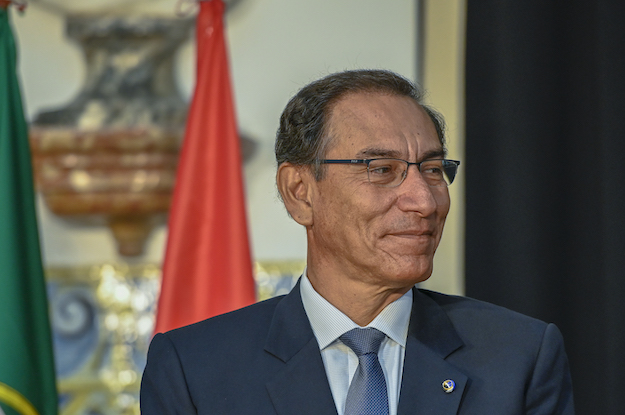LIMA, Peru — Infuriated by Congress’ endless corruption scandals and partisan bickering, Peruvians often express their desire for the entire political class to just vanish with the popular refrain, “!Que se vayan todos!” (“They all must go!”).
Thanks to President Martín Vizcarra’s latest, potentially definitive attempt to solve the governability crisis gripping Peru, voters may get their wish.
Since the 2016 elections, the deeply unpopular legislature has repeatedly clashed with a weak executive branch, undermining efforts at reform and even ousting Vizcarra’s predecessor Pedro Pablo Kuczynski. Hoping to end the cycle of confrontation, Vizcarra used his state of the nation address on July 28 to propose a constitutional reform that would allow early presidential and legislative elections.
The high-stakes gamble would rely on recalcitrant lawmakers, above all from the opposition Popular Force that dominates Congress, effectively voting themselves out of office.
The party is now so unpopular that it arguably has little to lose by defying overwhelming public sentiment and hanging on for an extra year in office. Yet it does still need to be wary of further alienating voters if it wants to preserve any remaining aspiration of one day forming a government.
Since Peru does not allow consecutive presidential terms, the proposal also means that Vizcarra would be volunteering to step down ahead of schedule.
If Vizcarra’s plan works, it would result in potentially unpredictable elections and only one near certainty: Popular Force, led by Keiko Fujimori, who remains in pre-trial detention on accusations of laundering illegal donations from Odebrecht, will face significant, possibly catastrophic losses.
But if Popular Force and its allies reject the measure, Vizcarra risks becoming something of a lame duck, weakened after having played his strongest political card with two years of his term still remaining.
Normally, Peru’s Congress and president are elected simultaneously for fixed five-year terms. Vizcarra wants to bring the next elections, scheduled for April 2021, forward 12 months. To do so will require first a simple majority in Congress and then a referendum tentatively penciled in for December.
The referendum would appear to be a foregone conclusion. Polls show nearly 80% of Peruvians in favor of early elections. However, for the electorate to have a say Vizcarra will first need to successfully use the bully pulpit of the presidency to leverage public fury and push reluctant lawmakers into passing the proposal.
The measure comes after months of sour relations between Vizcarra and legislators. The final straw for the president appears to have been Congress’ foot-dragging on a raft of reforms aimed at cleaning up politics, including making it easier to prosecute lawmakers and criminalizing illicit campaign funding.
The president won a vote of confidence from Congress conditioned on those reforms, but lawmakers then proceeded to pick apart specific proposals as they passed through the legislative process. In theory that would have given him the authority to dissolve Congress. However, such a move would have been constitutionally controversial, unlike the current proposal to simply bring the elections forward.
Vizcarra’s gambit is “an attempt at a Solomon-like solution,” said Anthony Medina Rivas Plata, a political scientist at Arequipa’s Catholic University of Saint Mary, who believes that Popular Force has been outmaneuvered.
“Vizcarra has been underestimated, perhaps because he came from this provincial background with no track record in Lima,” Medina Rivas Plata told AQ. “He must be the first president who wants to change the Constitution so that he can leave power rather than hang on to it.”
Nevertheless, some observers have criticized Vizcarra’s move. In his column for newspaper El Comercio, political scientist Alberto Vergara wrote that changing the rules of the game while it is underway is dangerous for democracy and shows the Vizcarra administration played its hand badly, including by at times relaxing its efforts to push Congress into reforming itself.
But Vergara also argues that the fujimoristas’ continual assaults on the government and their alleged alliances with organized crime, including illegal mining and the drug trade, gave Vizcarra little choice but to face them down. “Fujimorismo’s agenda over the last three years can be summed up as a simultaneous boycott on three institutional fronts: the executive, democracy and the rule of law,” he wrote.
The measure to bring elections forward will require 66 votes in the 130-member single-chamber Congress. So far, six parliamentary blocs totaling 42 lawmakers have signaled their support, while two groupings totaling 11 members have announced their opposition. In theory, that leaves 77 votes up for grabs.
However, those include the 54 Popular Force members, some of whom hurled insults at the president during his state of the nation address. Their party has yet to take an official position, but party spokesman Carlos Tubino gave a flavor of what may be to come by tweeting: “Bringing Forward Elections is the First Chapter on the route to chavismo!!!”
Vizcarra, meanwhile, is now well positioned should he want to run for president in 2025 or 2026. Nevertheless, there are risks for him beyond simply losing influence should Congress reject his proposal.
Various fujimorista politicians have demanded he resign, ostensibly for being unwilling or unable to govern and there has even been talk of impeaching the president. Popular Force leaders have publicly denied that they want to sack Vizcarra – and would likely struggle to round up the required supermajority of 87 votes to do so. But the fact that impeachment is once again a theme of Peru’s political discourse is a warning sign of more turbulence ahead.
—
Tegel is an independent journalist and analyst based in Lima. You can follow him on Twitter at @SimeonTegel.







